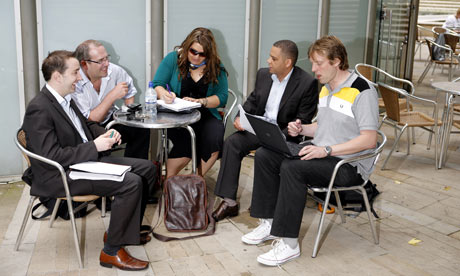
It could be a taste of the future for job interviews and the beginning of the end for curmudgeonly work colleagues.
Scientists at Cambridge University have used medical scanners to pinpoint brain features that identify someone as being a likeable "people person" or a wallflower.
The scans revealed that people who most value the company of others have, on average, more dense grey matter in two areas of the brain known as the orbitofrontal cortex and the ventral striatum.
These brain regions are involved in what scientists call "reward circuits" for some of our most basic pleasures, such as sweet food and sex.
Graham Murray, a psychiatrist who led the study, said the findings may provide clues to how humans came to be sociable beings. The brain may first have evolved to give us pleasurable sensations from eating and reproducing, and later developed to incoporate more complex behaviours, such as interacting with other people, he said.
By unravelling the neural basis of sociability, scientists hope to learn more about medical conditions such as autism and schizophrenia, which can have a devastating effect on people's ability to interact with others.
Murray's team asked 41 men to respond to more than 140 statements about themselves, rating how much they agreed or disagreed with each. They included around 20 statements that focused on sociability, such as "I like to please people as much as I can", and "I make a warm personal connection with people".
MRI (magnetic resonance imaging) scans of the men's brains revealed a strong link between those who valued social bonds with others and the density of grey matter in the two brain regions.
Murray, whose study appears in the European Journal of Neuroscience, said the differences in brain structure might begin early on in our development, and are then reinforced as we grow up.
"It's likely there's a snowball effect. If these brain structures happen to be more dense from the start, that may help you to be more sociable. But in turn, by being more sociable you will foster further growth in those brain regions," he said.
The technology may not find its way into company's recruitment processes any time soon, Murray added. "Doing a brain scan might be going a bit far. If you want to know if someone's sociable or not, the best way is to ask one of their friends."

